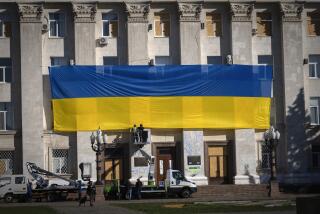After 13 Years Apart, an Airport Reunion Is Proof That Perestroika Is No Gimmick
- Share via
Television cameras, an oversize crowd, the Russian language heard everywhere in the international-arrival terminal at Kennedy Airport--all indicators pointed out that hers was no ordinary flight. As mother explained to me later, this was the first joint Aeroflot-Pan Am venture in the wake of improved Soviet-American ties, and the commemorative plaque that she proudly produced for everyone to see underscored the historical nature of the occasion.
Flight 31 marked a turning point in more ways than one. Thirteen years ago, when I left my native Russia, I wondered if I’d ever see my mother again. Now, what seemed impossible for so long was about to come true.
I stood at the gates for half an hour as passengers came and went, greeted by joyous shrieks from the waiting crowd, but my mother was nowhere in sight. An old lady clutching a cart with a few pieces of luggage in it caught my attention. I followed her for a while before my gaze turned elsewhere. Then, suddenly, I heard someone yell “De-e-e-m-a-a!” and the sound of my nickname jolted me out of my stupor. I looked back toward the elderly lady. Gray hair, face full of wrinkles, the yellowish hew around her cheeks--could she have changed so much? And then she smiled at me with that rascalish look that I remembered so well: “We’ve made it, haven’t we!” This was my mother, after all, as irrepressibly young inside as I ever knew her.
On the way to Manhattan she talked nonstop: Lev’s dissertation, Uncle Miron’s helath, the state of Galia’s marriage, our neighbors from the old communal dwelling on Lesnoi, the wallpapering saga in mother’s new apartment--there wasn’t news trivial enough to brush aside.
We jumped from one subject to another, her hands in mine, trying to cram 13 years worth of news into one taxi ride from Kennedy to uptown Manhattan. With the big picture in place, some significant details started to loom large.
I knew that mother had problems after my departure. A year or so thereafter, she felt compelled to quit her job at the Pushkin Museum in Leningrad where she had lectured for 20 years. Not that anybody blamed her directly for her son’s “treasonous behavior,” but after I applied for an exit visa many friends and colleagues grew visibly distant.
Things certainly have changed since then. What used to be a shameful liability turned into a proud asset once the Moscow Spring began to gather force.
“The thing is,” mother told me matter-of-factly, “if the stagnation under Brezhnev was anywhere as bad as it is now portrayed, emigration must have been an honest option, perhaps more so than staying put and keeping one’s mouth shut. This isn’t just my opinion: The Moscow News has published commentary to that effect--I have the issue somewhere in my luggage.”
I knew that the Soviet government was making overtures to some emigres, but I hadn’t seen anything as bluntly stated in the official Soviet press. Coming from my mother, a member of the Communist Party, who fought my decision to leave the country back in the ‘70s, this was a stunning admission.
“So now every week,” she continued, “somebody’s calling me and asking, ‘How’s Dima? Any news from the States? When is he coming home?’ By the way, when are you coming home?”
The ambiguity of her question didn’t escape me. “You mean as a tourist--or for good, as a prodigal son?”
“Either way, you might get a hero’s welcome. You simply wouldn’t believe what has been happening in the last year or two. People are getting out of jails, emigrant writers are back in print, even Solzhenitsyn’s name is no longer taboo. And you know what? Remember Igor Semenovitch, your dissertation adviser? He was finally allowed to visit the States, and he wants to meet with you!”
I knew exactly what she was so excited about. News from Russia reaching here lately infused me with the same mixture of wonderment, disbelief and hope. At last something was stirring in my God-forsaken homeland--confusing, fragile, to be sure, yet ever so exciting.
In the weeks ahead we would tackle this subject again and again, but for the moment I needed no further proof that perestroika wasn’t just a gimmick: the miracle of my mother, sitting next to me in this yellow cab, ready to be swallowed up by the Big Apple, was proof enough.
More news about life back home followed. I tried to concentrate, but my mind kept wandering. I thought about mother’s favorite dishes that I’d cook for her, the two grandchildren whom she’d soon meet and the America that I’d help her discover, and the feeling of well-being forgotten since childhood filled my heart.
More to Read
Sign up for The Wild
We’ll help you find the best places to hike, bike and run, as well as the perfect silent spots for meditation and yoga.
You may occasionally receive promotional content from the Los Angeles Times.






